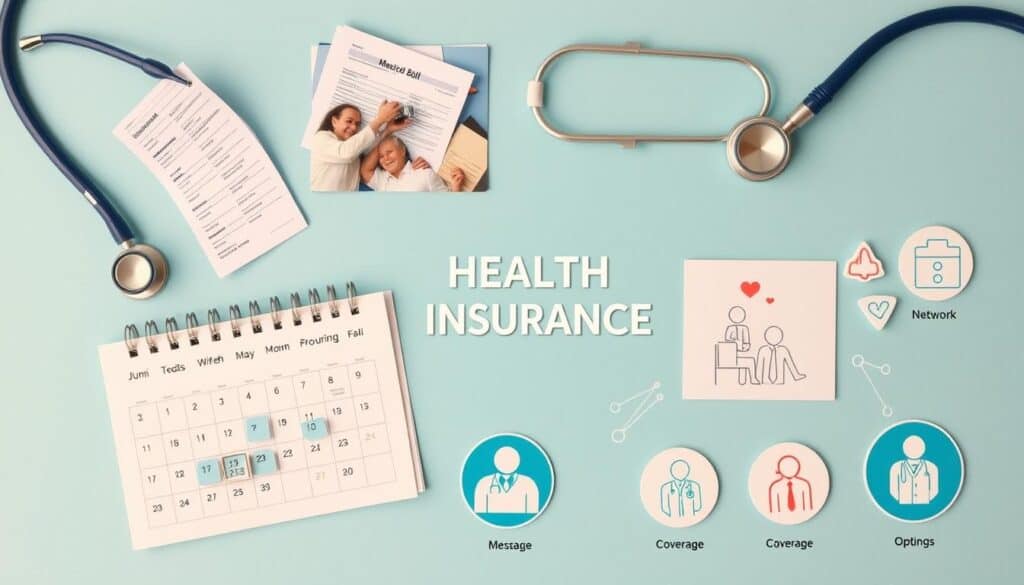Are you tired of feeling lost in the world of individual health insurance? We’re here to help you find the perfect plan that matches your needs and budget. For a complete understanding of health insurance options, take a look at our Comprehensive Guide to Health Insurance. In this guide, we’ll show you 5 key steps to finding the right coverage. You’ll learn how to make a choice that protects you well.

Key Takeaways
- Explore various options for individual health insurance, including employer-sponsored plans, Medicare/Medicaid, and healthcare marketplaces.
- Assess your predictable healthcare needs to determine the right level of coverage and out-of-pocket costs.
- Understand key health insurance terminology like premiums, deductibles, and copays to make an informed comparison.
- Seek guidance from impartial navigators to ensure you find the best plan for your individual situation.
- Beware of misleading online plans and stick to trusted sources when shopping for individual health insurance.
Know Where to Explore Individual Health Insurance Options
Looking for individual health insurance? There are many places to check. If you work, start with your company’s health plan. Many employers offer health insurance for their workers and their families.
Employer-Sponsored Plans
Employer plans often pay a big part of the premium. This makes them a good deal for people and families. These plans give you easy access to quality healthcare.
Medicare and Medicaid
Medicare helps those 65 and older with many medical services. Medicaid is for low-income families and individuals. If you qualify, these programs are great options.
Healthcare.gov and State Marketplaces
If you can’t get employer plans, Medicare, or Medicaid, look at the ACA Marketplaces. Healthcare.gov and state Marketplaces let you compare plans. You might get help with costs like subsidies or tax credits.
| Health Insurance Options | Key Features |
|---|---|
| Employer-Sponsored Plans | Affordable, comprehensive coverage, employer contribution towards premiums |
| Medicare | Federal health insurance program for those 65 and older or with specific conditions |
| Medicaid | Joint federal and state program providing coverage for low-income individuals and families |
| Healthcare.gov and State Marketplaces | Comparison of individual health insurance plans, with potential subsidies or tax credits |
By looking at these options, you can find the right health insurance for you. Think about the monthly cost, deductibles, and what services are covered.
Assess Your Predictable Healthcare Needs
Before picking an individual health insurance plan, look closely at your healthcare needs. Think about any ongoing medical conditions, the medicines you take, and future healthcare services you might need. This helps you figure out how much coverage you need and what features are most important, like specific doctors or good prescription drug coverage.
If you have a chronic condition, you’ll need a plan with a low deductible and more coverage. But if you’re healthy and just need routine check-ups and occasional urgent care, a plan with a higher deductible and lower premiums might work better.
Take time to really think about your healthcare needs and what you want. This way, you can pick a plan that offers the right mix of coverage and cost for you.
| Healthcare Needs | Recommended Plan Features |
|---|---|
| Chronic medical conditions | Lower deductible, higher coverage levels |
| Routine check-ups and occasional urgent care | Higher deductible, lower premiums |
| Specialty treatments and medications | Comprehensive prescription drug coverage, access to preferred providers |
By carefully looking at your healthcare needs, you can find a plan that offers the right balance of coverage and cost for you.
Understand Key Health Insurance Terminology
When looking at individual health insurance plans, knowing key terms is key. These terms affect your costs. From health insurance premiums to deductibles and copays, grasping these concepts is crucial. It helps you choose the right plan for you.
Premiums
Premiums are the monthly fees for your health insurance, even if you don’t use it. Comparing premiums helps find the most affordable plan that fits your health needs.
Deductibles
The deductible is what you pay first for healthcare before your insurance helps. Deductibles differ a lot between plans. It’s important to think about how much you can afford to pay before your insurance kicks in. A $1,000 deductible is often used as an example.
Copays and Coinsurance
Plans also have copays and coinsurance. Copays are fixed amounts for services like doctor visits or prescriptions, usually around $15. Coinsurance is the percentage you pay after your deductible, often 20% for in-network and 40% for out-of-network.
Knowing about these cost-sharing mechanisms helps you figure out your total costs. This knowledge is key to picking the best health insurance plan for you.

“Navigating the complexities of health insurance can be daunting, but understanding key terms like premiums, deductibles, and copays is essential for finding the right plan and managing your healthcare costs.” –
Get Free, Impartial Guidance from Navigators
Exploring the individual health insurance market can be tough. But, you’re not alone. Health insurance navigators offer free, unbiased help. They guide you through your options, explain plan details, and help with enrollment. These experts work without commission, focusing on finding the best plan for you.
In 2022, the Biden-Harris administration gave $98.9 million to 59 health navigator groups across the U.S. This included $12.5 million for more outreach, education, and enrollment support. They can help you grasp health insurance terms, figure out your healthcare needs, and compare plans to fit your budget and situation.
- Explore your individual health insurance options: Navigators can show you the different plans available, including those on healthcare.gov or your state’s exchange.
- Understand plan details: They explain the differences between premiums, deductibles, copays, and coinsurance. This ensures you pick a plan that fits your healthcare needs.
- Complete the enrollment process: Navigators help with the application and enrollment steps. They make sure you meet all important deadlines.
Use this free enrollment assistance and unbiased guidance to find the right individual health insurance plan for you.

Remember, navigators are here to give you the info and support you need. They help you make a smart choice about your health coverage. Don’t wait to reach out and start finding the right individual health insurance plan.
Beware of Misleading Online Health Plans
When looking for health insurance online, be careful of plans that seem too good. These might be short-term or limited plans that don’t meet the Affordable Care Act (ACA) standards. Stick to trusted sites like Healthcare.gov or your state’s health insurance exchange to find a real plan that fits your needs.
Stick to Trusted Sources
Real health insurance providers like Healthcare.gov only ask for basic info like your income and age for a quote. They don’t ask for your Social Security number, bank account, or credit card info. Scammers might claim to be from the government and ask for money or personal info. Always check if the seller is a licensed insurance agent.
Avoid Short-Term Plans with Limited Coverage
Short-term health insurance plans might seem cheap, but they have big drawbacks. They often don’t cover essential health benefits, have high deductibles, and can deny coverage for pre-existing conditions. It’s better to look for an ACA-compliant plan that offers full coverage.
To avoid scams, research health coverage companies thoroughly. Look for reviews and complaints about scams or fraud. Also, report any suspicious health insurance calls or offers to the right authorities.
“Scammers often pretend to be from the government, asking for money or personal information. They claim to be from government agencies but in reality, such entities do not ask for financial details or personal information over the phone.”
By staying informed and using trusted sources, you can get the healthcare coverage you need. Avoid falling for misleading or fraudulent plans.
Individual Health Insurance: Don’t Miss Crucial Deadlines
Timing is key when it comes to individual health insurance. You can sign up for or change your coverage during specific periods, like the annual open enrollment window. If you miss these deadlines, you might not get coverage until the next period or face penalties. Knowing the deadlines in your state and planning ahead is crucial to get the coverage you need.
The open enrollment for private health insurance happens from November 1 to December 15 each year. There’s also a special enrollment period for those with certain life events, allowing them to buy policies within 60 days. Medicaid and CHIP offer low-cost health coverage based on income and family size. Knowing these details can help you find the right health insurance plan.
Short-term health insurance plans might seem good, but they often have limited coverage and don’t protect you from penalties. Always use trusted sources, like the Health Insurance Marketplace, when looking at options. With the right information, you can navigate the health insurance world and avoid missing important deadlines.
| Enrollment Period | Details |
|---|---|
| Open Enrollment Period (OEP) | Runs annually from November 1 to December 15 for private health insurance plans. |
| Special Enrollment Period (SEP) | Allows individuals with qualifying life events to buy individual and family policies within 60 days. |
| Medicaid and CHIP | Offer free or low-cost health coverage based on income, family size, and citizenship status. |
| Short-Term Health Insurance | May have limited coverage and not protect from penalties for remaining uninsured. |
Remember, missing key health insurance enrollment periods can have serious consequences. By staying informed and taking action within the necessary timeframes, you can ensure you have the coverage you need to protect your health and financial well-being.
Conclusion
Finding the right individual health insurance plan can seem hard. But, by following the steps in this guide, you can find the best coverage for you. This way, you meet your healthcare needs and stay within your budget.
It’s key to look at all your options and understand insurance terms. Also, get advice from trusted sources and watch important dates. With the right plan, you and your family will be well-protected.
Choosing individual health insurance is a big deal. It affects your financial safety and health. By doing your homework and choosing wisely, you get the comprehensive coverage needed for your family’s health.
Dealing with individual health insurance can feel overwhelming. But, with the right info and help, you can find the right plan for you. Your health and your family’s is most important. By getting the right individual health insurance, you’re taking a big step towards a healthier future.
FAQ
Where can I find individual health insurance options?
You can find individual health insurance through your employer or government programs like Medicare and Medicaid. You can also visit Healthcare.gov or your state’s health insurance Marketplace.
How do I determine my healthcare needs?
Think about any ongoing health issues, medications, or future healthcare needs. This will help you figure out how much coverage you need.
What key terms do I need to understand when choosing an individual health insurance plan?
You should know about premiums, deductibles, and copays and coinsurance. These terms affect how much you pay for your insurance.
How can I get help navigating the individual health insurance market?
Health insurance navigators offer free help. They can guide you through your options, explain plan details, and help with enrollment.
What should I watch out for when searching for individual health insurance online?
Be wary of plans that seem too cheap. They might not offer the full coverage the Affordable Care Act requires. Always use trusted sites like Healthcare.gov or your state’s exchange.
What are the important deadlines I need to be aware of for individual health insurance?
Know the enrollment periods, like the annual open enrollment window. Missing these can leave you without coverage until the next period or lead to penalties.

